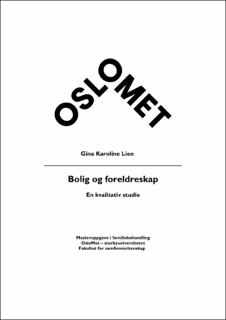| dc.contributor.advisor | Ulvik, Oddbjørg Skjær | |
| dc.contributor.author | Lien, Gina Karoline | |
| dc.date.accessioned | 2021-10-19T10:51:33Z | |
| dc.date.available | 2021-10-19T10:51:33Z | |
| dc.date.issued | 2021 | |
| dc.identifier.uri | https://hdl.handle.net/11250/2823856 | |
| dc.description.abstract | The purpose of this master’s thesis is to explore what housing means for parenthood. Questions raised are such as; how and why does our home affect us? How relevant is the material context for the family relationships? What do we find if housing and relational health are put in context? These questions are posed in order to better understand how parents think and perceive housing as a vital resource for their parenthood. In particular, this thesis investigates how parents have experienced the opportunities and challenges rented or owned housing have implied for their parenthood. Not being able to own your home is linked to relevant theory and research, which contributes to illustrate the study`s approach to the thesis question. The empirical data consists of six qualitative interviews with parents about what kind of implications housing have for their parenthood. Everyone had received a start-up loan and moved into a new home. Consequently, the study addresses two analytical topics; the housing journey and changes in parenthood.
Theory and research have shown that in Norway, the emergence of the welfare state has contributed to providing us with universal economic and social arrangements. It is pointed out that this has given many an opportunity for social mobility and consequently contributed to an increased middle class. In the wake of this, it seems that the view of being poor has changed. Being poor has moved from being understandable due to social structures, to being explained in quality of individuals. Further it turns out that most Norwegian families own their own home. This contributes to a decrease in knowledge and understanding of those who do not. It may seem as if the cultural norm of the middle class shadows the consequences of poverty. For those parents who experience not being able to offer stable housing for their children both external and internal stress can be experienced. In the interviews living conditions, stress and stigma became central topics. And this thesis brings in relational factors and how these should be viewed in context.
The result of the thesis show start-up loans has contributed to improving the informant`s parenthood. This thesis highlights how this can affect family relationships. Furthermore it is argued that the quality of the house must be made relevant as a theme in systemic practice with families. This knowledge is important for family therapists and other professional psychosocial practices, as it brings out the necessary conditions on which there is not always much focus. Focusing on these conditions can bring forward topics that highlight where a chain reaction possibly may have started to illuminate the differences of parenthood. | en_US |
| dc.description.abstract | Hensikten med denne masteroppgaven er å undersøke hva bolig betyr for foreldreskapet. Hvordan og hvorfor påvirker boligen oss? Hvor relevant er den materielle konteksten for relasjonene i familier? Hva finner vi hvis bolig og relasjonell helse blir satt i en sammenheng? Dette er noen av spørsmålene denne oppgaven stiller. Formålet er å løfte opp og frem hvordan foreldre erfarer og opplever å leie, kontra å eie bolig påvirker deres foreldreskap. Det å ikke kunne eie egen bolig sees i lys av relevant teori og forskning på feltet, og dette bidrar til å belyse oppgavens problemstilling. Empirien består av seks kvalitative intervjuer med foreldre om hva deres bolig har betydd for deres foreldreskap. Alle hadde mottatt startlån og flyttet i ny bolig. Studien tar for seg to analytiske temaer: boligreisen og endringer i foreldreskapet ved skifte til bedre bolig.
Teori og forskning har vist at i Norge har fremveksten av velferdsstaten bidratt til å gi oss universelle økonomiske og sosiale ordninger. Det påpekes at dette har gitt mange en mulighet for sosial mobilitet og dermed bidratt til en større middelklasse. Samtidig viser det seg, at i kjølvannet av dette, ser ut til at synet på det å være fattig har endret seg. Det hevdes at det å være fattig har beveget seg fra å være forståelig på grunn av samfunnsstrukturer, til å årsaksforklares i enkeltpersoners egenskaper. Videre viser det seg at flesteparten i det norske samfunnet eier egen bolig. Dette bidrar til at kunnskapen om og forståelsen for de som ikke gjør det kan ha minket. Det kan virke som om middelklassens kulturelle norm skygger for fattigdommens konsekvenser. Foreldre som har erfaring med å ikke kunne tilby stabil bolig for barna sine, kan oppleve både ytre og indre stress. I intervjuene ble levekårstress og stigmatisering sentrale tema, og oppgaven tar for seg relasjonelle faktorer og hvordan disse bør sees på i en sammenheng.
Resultatene i oppgaven synliggjør at startlån har bidratt til å bedre foreldreskapet til informantene. Oppgaven belyser hvordan dette kan påvirke relasjonene i familien. Videre argumenteres det for at boligens kvalitet må gjøres relevant som tema i systemisk arbeid med familier. Kunnskapen om boligens påvirkning er viktig for familieterapeuter og annen profesjonell psykososial praksis, da den bringer frem nødvendige betingelser som ikke alltid vektlegges. | en_US |
| dc.language.iso | nob | en_US |
| dc.publisher | OsloMet-Storbyuniversitetet | en_US |
| dc.subject | Bolig | en_US |
| dc.subject | Startlån | en_US |
| dc.subject | Foreldreskap | en_US |
| dc.subject | Familieterapi | en_US |
| dc.title | Bolig og foreldreskap | en_US |
| dc.type | Master thesis | en_US |
| dc.description.version | publishedVersion | en_US |
